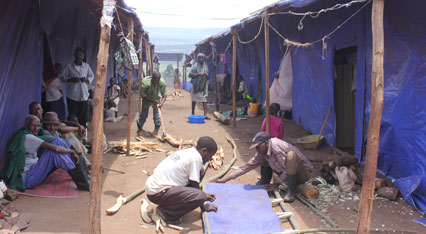Africa is seriously long journey from Australia. So I took the opportunity to visit some of Anglican Aid’s partners on the way to GAFCON.
Just before Nairobi, I visited the Diocese of Gahini in the north east of Rwanda at the invitation of Bishop Alexis Bilindabagabo.
I preached at the cathedral on the Sunday. I offered to wear robes but Alexis insisted that I remain smart casual (with a dog collar of course). He led the service while the youth pastor translated to me, and for me, when I preached. I was surprised that the service wasn’t The Lord’s Supper. I was told they held it once a month.
Hymns, songs, choirs, dancing and a simple liturgy led into three bible readings and the preaching of God’s word. I was bracing myself for a four hour marathon. It went for two and a half (including my 30 minute sermon, with translation).
At the conclusion of the service I was asked to pray for a newly married couple. The bridegroom had a prosthetic arm, severed by a machete during the genocide when he was a small boy.
I was accommodated at their simply appointed rustic conference centre. It overlooked a beautiful lake. Emerald green hills rose gently above the peaceful expanse of water. The next morning as enjoyed an unhurried quiet time with a strong brew of Rwandan coffee I could have been forgiven for thinking I was in Ireland - if not in paradise!
Right in front of me, almost within picking distance, stood a heavily laden avacado tree alongside an equally fruitful mango tree. A whisper thin mist was rising above the lake like a weightless cotton wool blanket.
“Ah, the serenity!” I was tempted to think, had it not been for the distinct fragrance of citronella all over every exposed inch of my skin to ward off the world’s most deadly predator.
Along with the sobering thought that the emerald hills standing sentinel over the lake were once stained with the blood of the most devastating genocide of my lifetime.
There is nothing like a dose of reality to jolt you out of a moment of romanticism.
On the Monday morning Alexis arrived right on 9 and we were off to see his diocese and many of its challenges. I had little idea of what lay ahead.
We drove for about an hour through some villages and hilly terrain to a major town and called in on the local mayor.
“Monsieur Mayor,” I was tempted to say, being a Les Miserables tragic, and finding myself in a French speaking country!
Monsieur Mayor joins us in the bishop’s 4X4. The conversation flicks between English, French and Kinyarwandan. I catch on gradually that our destination is a refugee camp on the Rwandan side of the border with Tanzania.
Arriving at the camp, a story of unspeakable tragedy and incomprehensible injustice unfolded before me.
The camp is home to 5,000 of the 11,000 Tanzanian refugees of Rwandan heritage who have been expelled from their adopted country. 5,000 confused and frightened men, women and children whose only crime is that they made Tanzania their home in the last 30 years, before, during and after the 100 day genocide of 1994.
These people are married to Tanzanians, have Tanzanian citizenship, own Tanzanian land and paid taxes to the Tanzanian Government. Many were born in Tanzania. But now they were being expelled and driven back into the country of their heritage. They were and are still Tanzanians.
I was shown around the makeshift camp, visited the mother of all bush schools that only a handful of all the children could attend, observed the crude medical outpost run by the ubiquitous Red Cross and was invited to a meeting of the camp’s representatives to hear stories of abuse and human rights violations.
About 40 men and women assembled in a large tent lined with a few crudely made bench seats. An UNHCR employee translated the stories to me.

One man spoke of being shot in the back while running into a heavily forested area in an attempt to escape being captured. He showed us his wounds. Another man showed us the injuries he sustained to his left arm as he tried to resist arrest and unlawful expulsion.
A mother spoke of her grief at being ripped away from her indigenous Tanzanian husband and two children. Somehow and somewhere in the chaos and darkness of a large truck where dozens of people were herded and transported like cattle, three other children who were separated from their parents attached themselves to her. She is now dealing with the emotions of not knowing the location and welfare of her own children while fretting for the children she has voluntarily taken on, as they fret for their own parents.
These families are homeless, stateless, locked in long and suffering limbo as frightened as any refugees and displaced persons anywhere in the world. The Rwandan Government, in cooperation with the UNHCR, is trying to locate distant relatives in the hope that they may take them in. But so many of their relatives were massacred in the genocide. They just want to return to the homes in Tanzania and resume their lives.
I never imagined my side trip to Rwanda would leave me with such a haunting memory.
A memory of 5,000 precious people. A small number of the 46 million displaced people across the world whose homes include windswept, dusty, tarpaulin cities where they sit and suffer in voiceless silence.
Except that in Alexis Bilindabagabo, and others like him, there are Christian leaders who are giving voice to their plight, who are fearless in being advocates for justice and compassion and, even more, faithful in bringing the gospel of hope to those who live without hope and in such traumatic circumstances.






















